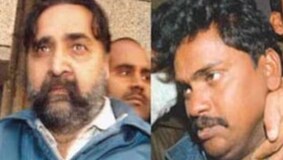A look back at the gruesome Nithari killings that rocked India

Key accused Surendra Koli and co-accused Moninder Singh Pandher in the infamous Nithari serial killings case in Noida. PTI
The Allahabad High Court on Monday acquitted the key accused Surendra Koli and co-accused Moninder Singh Pandher in the infamous Nithari serial killings case in Noida.
The High Court acquitted the culprits due to no direct evidence and witnesses.
In connection with the Nithari case, Koli was convicted of raping and killing multiple children between 2005 and 2006 and received 10 death sentences.
Related Articles
The appeals filed by Koli and Pandher challenging the death sentence imposed by the CBI court in Ghaziabad were accepted by a two-judge bench made up of Justice Ashwani Kumar Mishra and Justice Syed Aftab Husain Rizvi.
Defence counsel Manisha Bhandari told ANI, “The Allahabad High Court has acquitted Moninder Singh Pandher in the two appeals against him. There were a total of six cases against him. Koli has been acquitted in all appeals against him here.”
Also read: Kerala ‘human sacrifice’, a ‘brain eater’ and other horrors of ‘cannibalism’ in India
The horrific case
Also referred to as one of the most gruesome killings, the case came to light in 2006 when the police discovered skulls and bones of 16 persons, mostly children, in a drain near businessman Moninder Singh Pandher’s house in Noida’s Nithari village.
According to Livemint, investigation began after two locals claimed they knew the location of the remains of children, who had gone missing in the previous two years. They had also accused the authorities of ignoring their complaints. This also led to the suspension of two policemen for failing to take action.
News18 reported that it was alleged that Surendra Koli, the domestic help, would lure the children to the large house by offering sweets and chocolates, kill them, and have sex with the corpses.
As per Hindustan Times, he even confessed to eating their body parts. He would throw skeletons and other body parts of the victims into a ditch behind the house.
Koli was also accused of cannibalism.
The case was handed over to the CBI within 10 days and more bones – most of whom were of children and young women around the area were recovered during its search.
Upon investigation, Koli and his employer Pandher were taken into custody – during which Koli “confessed” to the crimes.
Pandher was named as the co-accused of brutal murders and rape in the case. The duo carried out the serial killings between 2005 and 2006.
A total of 19 cases under Sections 302, 376, 364, 201 and 120 (B) of the Indian Penal Code (IPC) were lodged against Pandher and Koli in 2007 for murders, abductions and rapes besides destruction of evidence.
Huge setback for CBI
The Allahabad High Court ruling is a major setback for the Central Bureau of Investigation, whose Ghaziabad court had sentenced both suspects to death.
However, the High Court and the Supreme Court upheld Surendra Koli’s death sentence in the 2005 Rimpa Halder murder case.
In the murder case involving the 14-year-old girl, one of multiple victims, both were handed the death penalty based on the evidence presented.
On 15 September, the court had reserved its decision following the High Court’s conclusion of the application hearing.
The first of Koli’s twelve petitions was submitted in the year 2010. Koli and five other death row inmates submitted mercy applications in 2014, but then-President Pranab Mukherjee denied them.
While the Allahabad High Court cleared Koli in 12 cases, one of those cases had his death sentence upheld, while another saw its death penalty modified to a life sentence on September 7 due to delay.
There are no eyewitnesses to this incident, it was claimed in court on behalf of the defendants. Only based on circumstantial and scientific evidence was he found guilty and given the death penalty.
With inputs from agencies

Atul Tiwari is a seasoned journalist at Mumbai Times, specializing in city news, culture, and human-interest stories. With a knack for uncovering compelling narratives, Atul brings Mumbai’s vibrant spirit to life through his writing.







